A couple of large projects to improve salmon habitat are planned for Whidbey Island beaches on Navy property and at Deception Pass State Park.
The state Salmon Recovery Funding Board recently announced $21 million in grants for projects across the state to aid in salmon recovery. The list of projects include two on Whidbey Island that are sponsored by the nonprofit organization Northwest Straits Marine Conservation Foundation.
The larger is a $495,000 project is on Navy-owned property at Polnell Point on North Whidbey. It will remove 2,000 tons of “armor” rock and debris along 1,400 feet of shoreline, remove and decommissioning of 500 feet of road and revegetation of restored shoreline with native dunegrass.
A 2016 study of the Crescent Harbor salt marsh found that the number of juvenile and adult chinook are declining, the population of pinks is stable while the population trend is unknown for cohos and chum, according to the project application.
Construction is planned to begin next summer.
The Salmon Recovery Board awarded a $66,500 match to the project, while Northwest Straits will be responsible for $428,000.
In addition, Northwest Straits Marine Conservation Foundation is sponsoring a $305,000 project at Hoypus Point in Deception Pass State Park. It’s the third phase of restoration efforts at the Cornet Bay day use site.
The project will remove up to a third of an acre of fill material and shore armor. A portion of a road will be turned into a gravel trail. Beach nourishment will be added to supplement forage fish spawning. A riparian area will be planted with native trees, shrubs and groundcovers.
Volunteers from the Island County Marine Resources Committee and Whidbey Conservation District will assist with plantings and maintenance of the vegetation.
“The site is located along a transport zone within the upper third of the 2.4 mile long drift cell and the project will restore a bluff-backed beach and the marine riparian connection,” according to the project description.
The project is aimed at improving habitats for Chinook, coho, chum, pink and steelhead. The area is a known spawning site for surf smelt and Pacific sand lance.
The project is supposed to be completed by spring of 2023.
The Salmon Recovery Board awarded a $155,000 grant for the project and Northwest Straits is responsible for the remaining $150,000.



